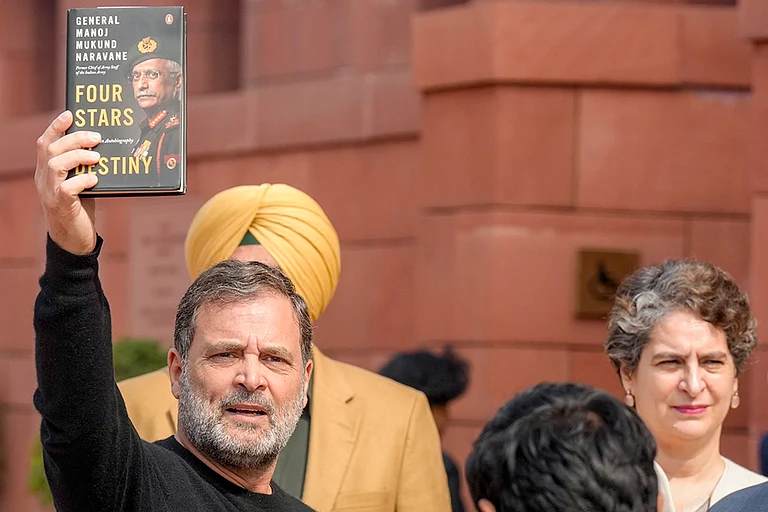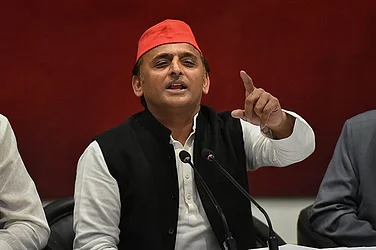Narendra Modi's Bharatiya Janata Party (BJP), with the help of National Democratic Alliance (NDA) led by it, was able to secure a majority, a reduced one, in the recently concluded 2024 Lok Sabha elections of India.
Both the BJP-led NDA and Opposition bloc 'INDIA' defied expectations and exit poll predictions as the former secured fewer votes than not just its '400-paar' (400-plus) target, something it had chanted throughout its Lok Sabha election campaign, but also its previous general polls tally, while the latter pulled off a surprising performance by securing 234 seats, not very far from the 293 figure of the Saffron camp.
While BJP-led NDA staked claim to form the government comfortably as the alliance won over 290 seats, its reduced majority, a poorer performance than 2019 general elections have made the result a huge setback to the Saffron party which was banking on Narendra Modi's popularity and some of the significant milestones, like the CAA implementation, Ram Mandir opening, Chandrayaan 3 launch, and G20, the country hit during his term to get a huge mandate.
Many world leaders congratulated Narendra Modi and the alliance led by his BJP for securing a third term, foreign media had several things to say on the election results in India, which sent out a clear message by the people of the country that Brand Modi has lost its shine and the BJP is no more in its 2019 position where it didn't need its allies to form government and needed the NDA partners more than ever.
World Media On Indian Elections
'Aura Of Invincibility Around Modi Shattered': NYT
Foreign media outlets described the outcome of India's general elections to reflected that the "aura of invincibility" around Prime Minister Narendra Modi has been "shattered" by the Indian voters who gave the Opposition a new lease on life.
According to the results for all Lok Sabha constituencies, the Bharatiya Janata Party (BJP) won 240 of the 543 seats and the Congress 99. The BJP-led National Democratic Alliance has comfortably crossed the majority mark of 272 in the 543-member Lok Sabha though the BJP lost its outright majority.
The New York Times started its report by noting, "Suddenly, the aura of invincibility around Narendra Modi has been shattered." Terming the results as "unexpectedly sobering," it noted that they were a "sharp reversal a decade into Mr Modi’s transformational tenure."

"Modi’s Party Wins, but it’s far from a landslide," said the second lead story on the front page of The NYT. "A sobering result for a Prime Minister on the Cusp of a 3rd term,” the daily said on its front page which carried a picture of Modi at the BJP headquarters in New Delhi after the election results were out.
'India's Voters Rebuke Modi': The Washington Post
"India's voters rebuke Modi," read the lead story of The Washington Post, which is now owned by Jeff Bezos of Amazon, and added that the election results were a rare setback for Hindu nationalists.
For the past decade, India has been "synonymous internationally with its prime minister, Narendra Modi. But on Tuesday, as final election results poured in, the electorate appeared to show dissatisfaction with the status quo and placed the serial winner onto shaky ground," The Washington Post wrote.
There was “tepid support for his Hindu nationalist party, piercing the air of invincibility around the most dominant Indian politician in decades, it said.
'Modi Declares Win But Faces Setback': The Wall Street journal
The Wall Street Journal's lead story was headlined "Modi Declares Win but faces Setback", featuring a picture of the Prime Minister at the BJP headquarters in New Delhi along with the party president JP Nadda amid a shower of petals.

All these above-mentioned major US newspapers had been very critical of Narendra Modi during the election campaign and had said that the country was headed towards a "majoritarian and authoritarian regime". The exit polls and opinion polls before the election results had said that the BJP would easily cross the 300 mark in a Lok Sabha.
'A Triumph For Indian Democracy': The Economist
UK-based weekly newspaper The Economist headlined their article on the Indian general elections 2024 outcome 'A Triumph For Indian Democracy'. The article said that the the "world’s biggest electorate has just shown how democracy can rebuke out-of-touch political elites, limit the concentration of power and change a country’s destiny."
Pointing to the erred exit poll predictions, the article said, "After a decade in charge, Narendra Modi was forecast to win a landslide victory in this year’s election; yet on June 4th it became clear that his party had lost its parliamentary majority, forcing him to rule through a coalition."
'Narendra Modi Suffers Surprise Loss Of Majority In India Election': The Telegraph
Another British daily, The Telegraph, wrote in its article 'Narendra Modi suffers surprise loss of majority in India election' that Modi's party - the BJP - "was set to lose its majority for the first time after falling well short of an expected election landslide, hampering ambitious plans to change the Indian constitution and cement his grip on power."

In the 543-seat Lok Sabha, securing over 400 seats would mean a two-thirds majority in the Indian parliament, which would have given the ruling party sweeping powers, enough to alter the country’s constitution which has been questioned by BJP leaders in the past for its secular credentials.
One of the biggest shockers of the Lok Sabha elections 2024 was the BJP losing hold in Uttar Pradesh, a key Hindi heartland state known for being a stronghold of the Saffron party. The state, which comprises 80 Lok Sabha seats, favoured the INDIA bloc of the Opposition as Samajwadi Party (SP) and Congress won in over 40 seats, keeping BJP from hitting the halfway mark.


























